June 20th: Laura Rink
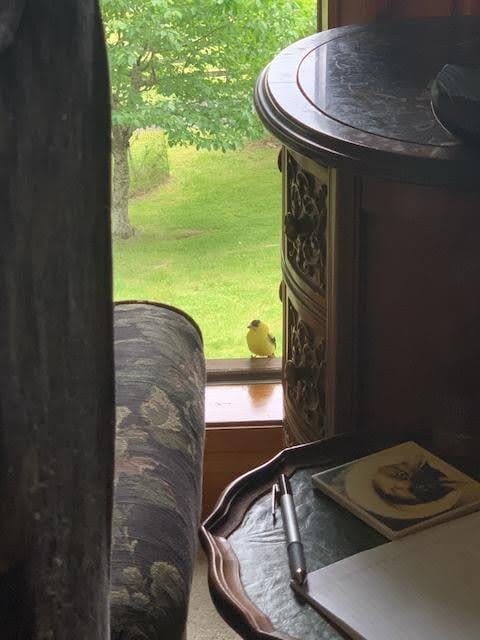
It’s 5am and if I were at home the goldfinch would be tapping at one of the upstairs windows as he has been doing for weeks now. Four inches of bright yellow with a black forehead pecking at his own reflection, trying to vanquish a perceived threat. I worry about the amount of energy burning through his tiny body; I hang a small bird feeder filled with thistle seed. He rests, he eats, he taps.
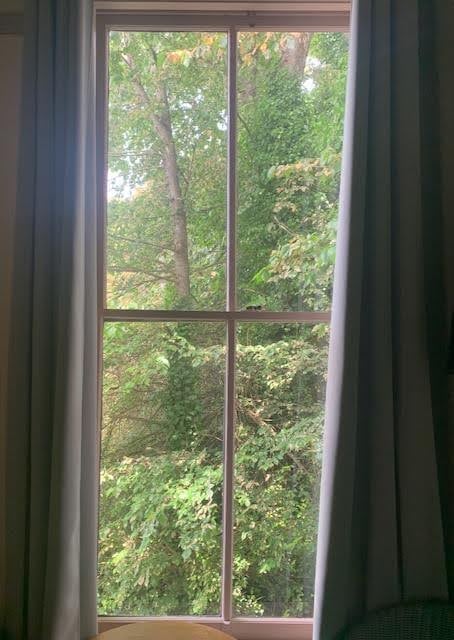
But I am not at home. I am fifty miles away in a hotel built in 1907 in the fishing and farming, now more artsy and touristy, town of La Conner along the Swinomish Channel. The only sounds here are the hum of the box fan in the hallway and the shuffle of tree branches outside the single window. The ceiling fan spinning above me is silent. I arrived yesterday and, despite the early hour, slept well, which is unusual for me in a new place. My body is comfortable here.
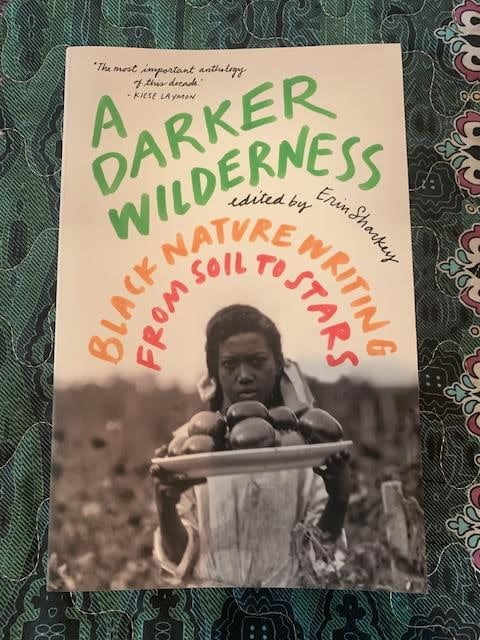
I grab my phone to check the weather—temp 51, feels like 45 with the breeze, rain expected. Briefly, I scroll through Facebook: writerly posts, bird queries, cats on catios. I exchange my phone for a book: A Darker Wilderness: Black Nature Writing From Soil to Stars, edited by Erin Sharkey.
This book was recommended by a writing mentor. She said it has good examples of scenes that show the childhood influences on the narrators, how their values and beliefs were formed. This is in response to my writing about my formative childhood experiences that shaped my beliefs about my country, the United States of America. The childhood idealism. We the people. Give me your tired, your poor, your huddled masses. Justice for all. The adult reality. I’m also writing about the Ottoman Empire and the Republic of Turkey as I search for my Armenian grandmother’s life there, before, during, and after the Armenian Genocide. The negative similarities between these two countries make me uncomfortable. I love my country and my country too has caused, is causing, great harm to groups of people.
In the book, I finish “This Land is My Land” by Sean Hill and begin “Confronting the Names on this Land” by Lauret Savoy. Both essays make me think about not only land ownership in America, but how today’s independent Armenia is on but a fraction of Armenian traditional lands. It makes me think about a group of people’s claim to land and the complexities when multiple groups claim the same place.
It's 7am and my body needs to move.
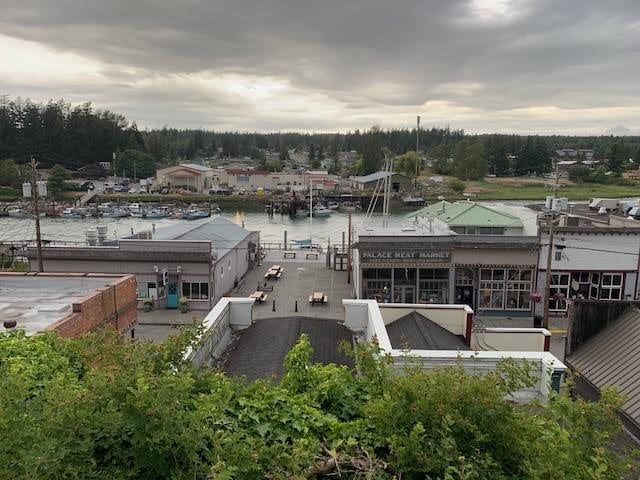
I go out into the overcast day along the top of the bluff overlooking the town, the channel, and the dozens of crab traps stacked at the Swinomish Shellfish Co. on the other side. I move past a large Victorian house now occupied by the Quilt and Textile Museum, and pause at the Butterfly Garden vibrant with blossoms but not butterflies this morning. Down the stairs, where later today a man will sit on the bench halfway down, his two goats on leashes, I cross the street to the boardwalk which runs the length of downtown along the channel. The few people I meet all say good morning, even the surly looking man who surprises me with a warm greeting.
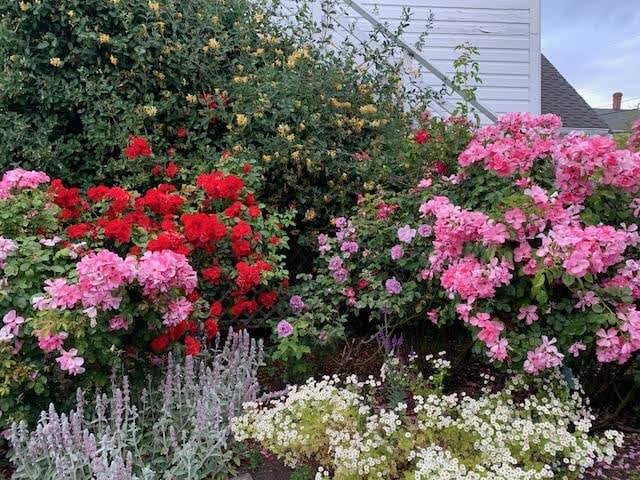
The breeze picks up, ruffling the water in the channel. Darker clouds swirl in the south, the rain pushes closer.
I treat myself to a berry scone from the bakery across from my hotel which I add to the hard-boiled egg and nuts I’ve brought. I prefer to eat simply and have my own food for most of the weekend: carrot and celery sticks with hummus, cheese and crackers, apples and bananas, yogurt, peanut butter, and granola, avocado and olives, celery juice, tea, and water.
Part of the reason I am in La Conner is to work on my Armenian family memoir. I am supposed to revise some muddled chapters but instead I turn to a more joyful task: transcribing my great-aunt Hilda Haigazn’s handwritten letters, in English, from the 1930s. She has come from Turkey to America on a student visa and is attending Mount Holyoke. In this particular letter dated November 20, 1932, to an Armenian friend attending a different college in America, she writes of attending her first football game, describes it as quite rough, and can’t decide whether to like or not to like it. It is slow going deciphering her handwriting, but at least I can read handwriting, a skill I fear is dwindling.
Two and a half hours after my morning walk, my body needs to move again. I stroll down the boardwalk. Pigeons coo underneath. The staccato chatter of a kingfisher has me searching along the opposite bank. I get a glimpse before the kingfisher zips into the shadows of the forest.
Coming back along the street, I window shop, each display a curated archive of consumer artifacts—a cooperative artists’ gallery, a bird supply shop, a wood merchant, ceramics, art supplies, a yarn store, clothing stores, and the holy grail of stores, a small bookshop. The bookshop is for sale and I snap a photo to post on Facebook: Friends, what an opportunity!
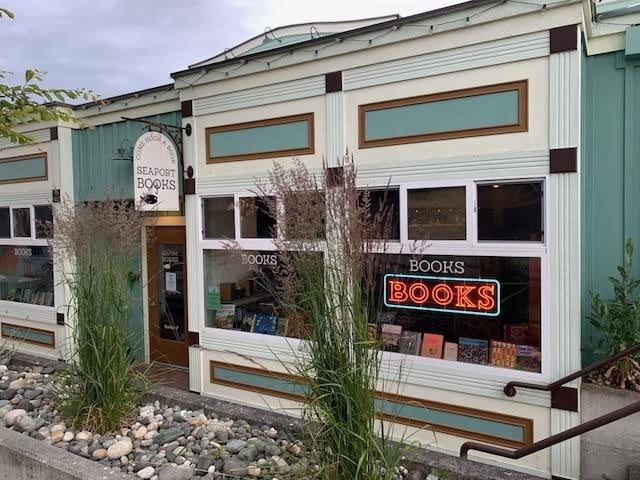
At 11:30am, people are amassing now in groups of two, four, and more. The greetings have tapered off. I stop making eye contact. We all move about our business, interacting within our own small circles. For me, that means jotting notes in my journal.
From the same bakery as earlier, I grab a smoked turkey and artichoke brioche sandwich. This is a mistake, for while it is delicious, it is also rich and heavy. And soon I will be exercising. What brought me to La Conner is a yoga and poetry workshop, which begins, with yoga, at 2pm. I walk off some of the full feeling, and then, back at the hotel, must decide to nap or not to nap. I’ve been napping almost daily since my first bout with Covid in April of this year. As far as having Covid goes, I give it zero stars—do not recommend.
Today I do nap, thirty minutes of drowsy bliss, just under the surface, but not too deep that makes rising a chore.
I send a picture to my husband, captioned: This hotel is also a jail.
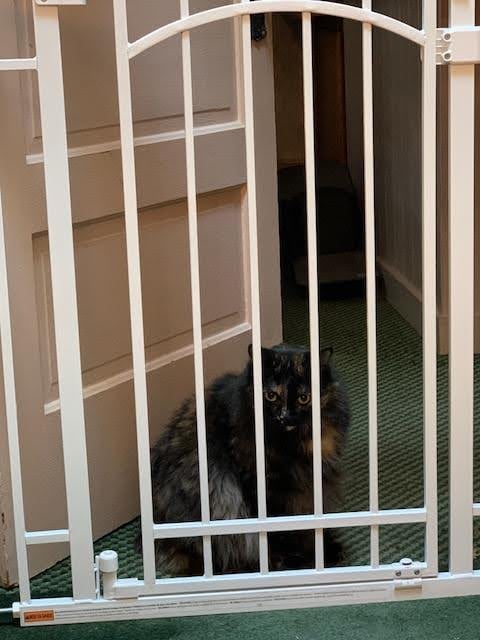
The yoga/poetry workshop is in a large community space, Maple Hall, also used as a senior center. We are in the auditorium complete with a stage draped with burgundy curtains, a vast expanse of hardwood floor now dotted with a rainbow of yoga mats, and a disco ball hanging from the ceiling. About thirty of us will spend two and a half days in this space moving our bodies and writing.
While I’ve practiced yoga for decades, this yoga practice with the details of form and the length of the holds is challenging. It also feels like what my sixty-year-old body needs.
The poetry also involves body movement, enacting the sounds of each vowel and several of the consonants. The third component of poetry—there is always a third thing, says poetry goddess Judyth Hill who leads the poetry part of the workshop—is silence. White space on the page. Standing, we recite poetry together—embodied poetics in action. We create poetry cupboards, collections of words to draw from. We are instructed to write down the name of a river, a mountain range, a metal, a hat, a number, a time of day. The list goes on and on. We use some of our answers to write a poem, each line beginning “I am . . . .”
I am Sorry, Sorry, Sorry. [childhood game]
I am a towhee, red-eyed and long-tailed. [bird]
I am a garnet sluiced out of a riverbed. [gemstone]
We write for five minutes, and I shift out of my body and into my head—overthinking, judging, freezing up. Judyth gives me two suggestions: walk while writing to perhaps keep my body more engaged than my mind, and also the classic write-your-way-through—keep writing, write your unhelpful judgy thoughts, just keep writing, and see where it takes you.
I leave the workshop at 6pm. I expected rain but instead it is gloriously sunny with scattered clouds. It would also be fair to say it is partially cloudy with sun breaks. But I use the word glorious because that is how I feel. It is the end of the day and I am not foggy headed and bone weary. I am alert. I am ready for the next thing, whatever that might be.
I drop my stuff in my room, grab an apple, and head for the boardwalk. I move my body in the sunshine of the solstice. I inhale the salty air along the channel. I plop onto a bench and pull out my journal. I hear a guitar playing and a man singing. One repeated line gets my attention: “Ask any old barstool in this town.” Earlier I passed a Coming Soon banner for Pie Dive Bar, which will serve savory and sweet pies in a Preserved Dive Bar Space.
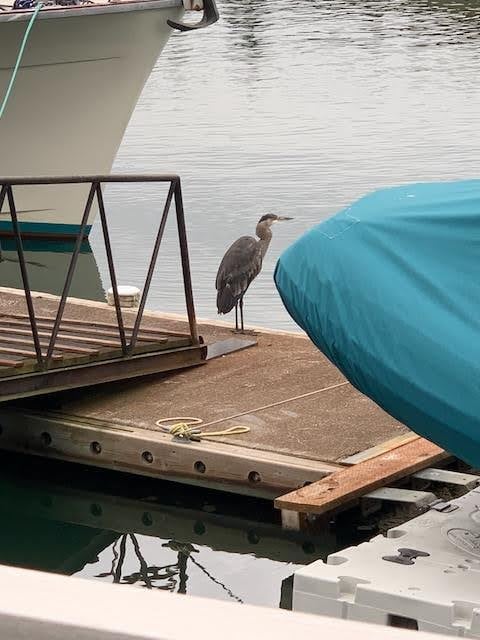
I watch an eagle land on its nest and a blue heron stand on a dock. I text my husband an update of my day. I return to my hotel room and eat the tofu pad thai I had bought from my Food Co-op back home. I transcribe some more of my great-aunt’s letter. A graduate student has a typewriter she can use whenever she wants. O, I am so happy. Especially as I am going to write a biography of Jesus as the final examination of my religion course!! Wow, I wish I had that to read.
I return to “Confronting the Names on this Land” by Lauret Savoy. I consider where I am. A white man bought this town in 1869 for $500. In 1870, he changed the town’s original name, Swinomish, to La Conner after his wife, Louisa A. Conner. Across the Swinomish Channel are the current lands of the Swinomish Tribe, established by an 1855 treaty. In Bellingham, I live on land that previously belonged to the Coast Salish people.
It’s 8pm and if I were at home the goldfinch would still be tapping. I would’ve implored him to chill several times throughout the day. He’d cling to the window frame and tap the glass. He’d pull tiny black seeds through the mesh feeder. He’d fly away only to return.
But I am not at home. I pull my laptop across the bed, open Netflix, and watch the next episode of The Lady’s Companion in Spanish with English subtitles. Later, I will fall asleep to the hum of the fan out in the hallway. I will hear no other sounds tonight.
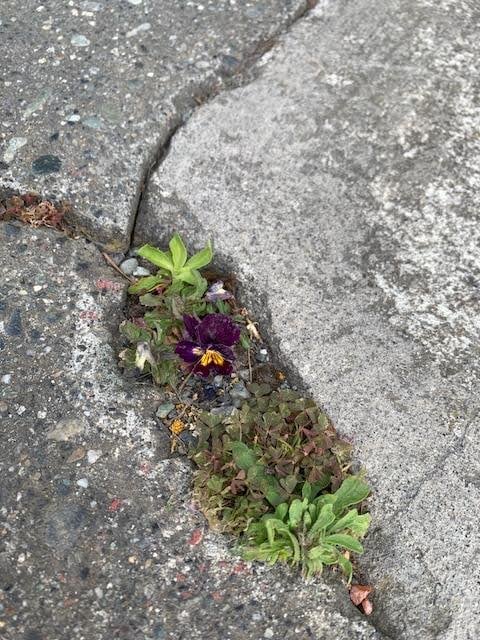
Laura Rink earned her MFA in Creative Writing from the Rainier Writing Workshop in 2021. Her essays can be found at the Brevity Blog, Two Hawks Quarterly, The Keepthings, and Complete Sentence. She blogs at LauraRink.com.